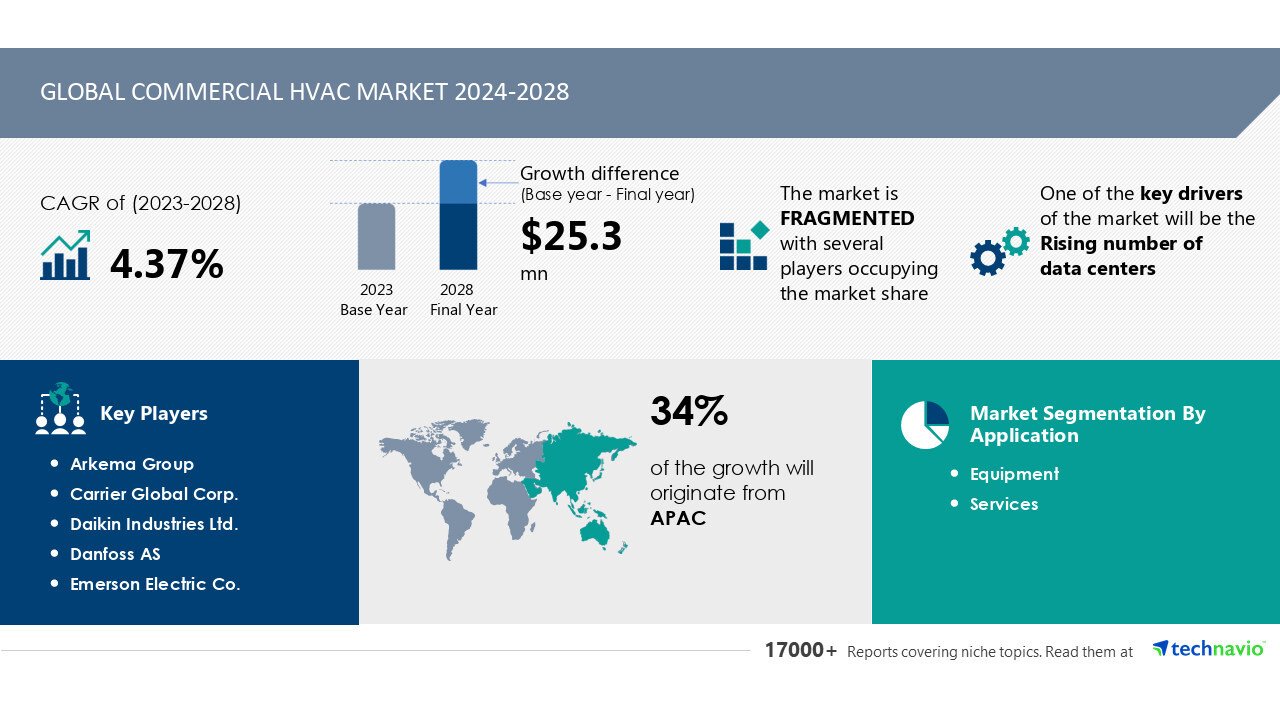Commercial HVAC Market to Grow by USD 25.3 Million from 2024-2028
The global commercial HVAC market is projected to experience significant growth, with an estimated increase of USD 25.3 million between 2024 and 2028, growing at a compound annual growth rate (CAGR) of 4.37%, according to Technavio. A driving force behind this expansion is the rising number of data centers and the growing demand for smart and connected HVAC solutions. Key players in the market include prominent companies such as Arkema Group, Carrier Global Corp., Daikin Industries Ltd., Danfoss AS, Emerson Electric Co., Fujitsu Ltd., and others.
Market Drivers: Rise of Smart and Connected HVAC Solutions
The adoption of smart and connected HVAC systems is fueling market growth. These advanced systems, featuring technologies like IoT integration, smart thermostats, and air monitoring systems, are transforming the industry by enhancing energy efficiency and improving indoor air quality. IoT-enabled HVAC systems offer real-time monitoring, predictive maintenance, and improved controllability, addressing the demands of modern buildings.
Smart thermostats allow for remote temperature control and learning capabilities, boosting energy efficiency. Air monitoring systems detect and eliminate contaminants, allergens, and pollutants, reducing the need for frequent maintenance. Major companies, including Daikin, Voltas, and Emerson Electric, are leading the charge in offering innovative HVAC solutions.
Market Trends: Sustainability and Energy Efficiency
The commercial HVAC market is heavily influenced by global sustainability efforts and the need for energy-efficient solutions. The integration of IoT technology into HVAC systems allows businesses to optimize climate control, reduce operational costs, and meet new regulatory standards. Key trends driving the market include:
- Energy-efficient and sustainable buildings: Buildings are increasingly being retrofitted with eco-friendly solutions to reduce carbon emissions and energy consumption.
- Climate control and indoor air quality: The focus on providing better climate control while maintaining optimal indoor air quality is growing, especially in the commercial sector.
- Climate change mitigation: HVAC systems are central to efforts aimed at reducing carbon footprints and combating climate change.
Challenges: Intense Market Competition
Despite the market's promising growth trajectory, competition remains a significant challenge. International and regional players, particularly in the Asia-Pacific (APAC) region, offer HVAC systems at lower prices due to cheaper raw materials and labor costs. In regions where HVAC regulations are less stringent, counterfeit products further intensify price-based competition. Additionally, consolidation activities, such as mergers between HVAC equipment manufacturers and building control solution providers, are driving profit margins down.
Technological Advancements in the HVAC Market
The global commercial HVAC market is being reshaped by advances in technology. Smart HVAC systems, powered by sensors and data-driven analytics, are improving operational efficiency. The market is seeing growing interest in variable refrigerant flow (VRF) systems and advanced heat pump technologies that offer better performance and energy efficiency.
Additionally, data centers, one of the primary sectors driving the demand for HVAC solutions, are adopting liquid cooling technologies, as traditional air cooling systems become inadequate for managing heat in high-density environments. Liquid cooling is more efficient and helps reduce energy consumption and operational costs, contributing to the market's expansion.
Future Outlook
The global commercial HVAC market is expected to grow significantly over the forecast period, driven by advancements in smart HVAC technologies, increased regulatory focus on energy efficiency, and the need for sustainable solutions. The market will continue to evolve, with players leveraging IoT technology, sensors, and analytics to meet the growing demand for efficient and eco-friendly climate control systems.
